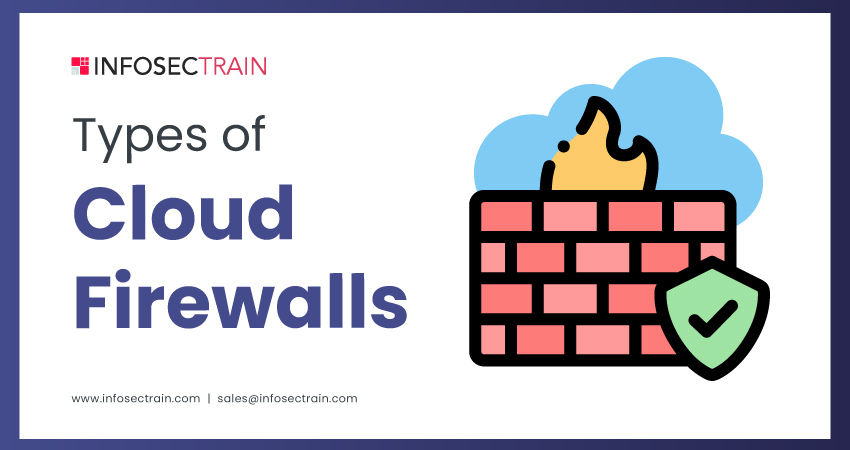Types of Cloud Firewalls
In the vast digital world where data moves freely and cyber threats hide, having strong cybersecurity is crucial. Cloud firewalls act like powerful guards, protecting users from malicious actors and actively preventing potential threats. These defenders are the backbone of the defense, constantly watching for and stopping any dangers. The world of cloud firewalls is diverse and continually changing, reflecting the complex challenges of cybersecurity. Organizations need to wisely combine different firewall types to navigate the digital landscape, stop specific intrusions, secure web applications, or adopt the latest cloud-native solutions.

Table of Contents
What is a Firewall?
What is a Cloud Firewall?
Types of Cloud Firewalls
Benefits of Cloud Firewalls
What is a Firewall?
A network security device firewall actively observes and manages inbound and outbound network traffic according to predefined security regulations. It establishes a barrier between trusted and untrusted networks, like the Internet. Whether in the form of hardware, software, or a combination, a firewall can be configured by organizations to allow or block specific types of traffic, such as HTTP, FTP, and email traffic. Furthermore, it can permit or deny traffic from particular IP addresses or domains. A firewall is crucial in any network security strategy, enabling organizations to shield their networks from threats.
What is a Cloud Firewall?
A cloud firewall is deployed in the cloud, forming a virtual barrier to prevent malicious network traffic. It operates similarly to traditional firewalls, but the critical distinction is that the cloud firewall is hosted on a cloud platform. Cloud firewalls actively function as security products, acting as shields to protect against unauthorized network traffic. They extend this protection to various cloud components, including Cloud CRM, Cloud Database, and Email Cloud.
Types of Cloud Firewalls
1. Network-Based Cloud Firewalls: Network-based cloud firewalls actively check and control data packets using predefined rules, playing a pivotal role in cybersecurity. They utilize packet filtering and proxy firewalls to ensure that only authorized traffic moves through the digital pathways. These watchful gatekeepers actively help create a safe online space by keeping an eye on and filtering network traffic in real time. Their essential role is crucial in keeping the digital world secure and intact.
2. Web Application Firewalls (WAF): Web Application Firewalls (WAFs) actively defend web applications in the dynamic online environment. They protect against various cyber threats, such as SQL injection, cross-site scripting (XSS), and other malicious activities to exploit vulnerabilities in web applications. They play an active role by filtering and monitoring HTTP traffic, ensuring the protection of web applications from specific cyber threats. These vigilant guardians actively monitor the traffic to keep web applications safe. Their proactive stance is crucial in safeguarding against targeted online risks.
3. Next-Generation Firewalls (NGFW): NGFWs enhance security by blending traditional features with intrusion prevention, application awareness, and thorough packet inspection. They act as vigilant guards, defending against cyber threats to ensure a secure online environment. Their proactive approach is essential in looking for potential dangers in the digital landscape.
4. Firewalls as a Service (FWaaS): FWaaS actively dominates the cloud services scene, putting users in control. It enables users to actively manage and set up firewall services using user-friendly web interfaces or APIs, offering an adaptable and hands-on approach to security. This active service empowers users to easily navigate and customize their firewall settings for optimal protection. Its user-friendly features actively contribute to a flexible and secure online experience.
5. Host-Based Cloud Firewalls: Host-based cloud firewalls control incoming and outgoing traffic within individual servers or devices. As vigilant gatekeepers, software and application layer firewalls proactively secure specific protocols and applications. In simpler terms, they are like digital bouncers for your computer, actively deciding which data gets in and out to keep it safe. These firewalls ensure that only the right digital traffic enters and exits your device.
6. Cloud-Native Firewalls: Cloud-native firewalls actively contribute to defense with solutions provided by cloud providers. In AWS, Security Groups, and Azure, Network Security Groups actively manage and control traffic at the network layer, smoothly integrating with the cloud infrastructure. These are like digital traffic managers in the cloud, ensuring only the correct data moves around. They actively help organize and secure information flow in cloud platforms like AWS and Azure.
7. Container Firewalls: Container firewalls actively secure traffic between containers in the era of containerization. They play a crucial role in actively ensuring the integrity and security of containerized applications, especially in environments like Docker and Kubernetes. Think of them as digital bodyguards for your apps, ensuring they stay safe and sound in containers. These firewalls actively monitor and control container data flow to keep everything secure.
Benefits of Cloud Firewalls
1. Enhancing Security:
Cloud firewalls actively safeguard cloud-based resources against various threats, such as malware, phishing attacks, and denial-of-service attacks. Think of them as digital shields that actively work to keep your online assets safe from different types of harm. Their job is to actively guard and repel potential dangers in the digital world.
2. Centralized Management:
Organizations can actively manage cloud firewalls from a central point, simplifying the task of overseeing security across various cloud environments. It’s like having a control center where you can actively monitor and adjust the security settings for all your digital spaces. Cloud firewalls provide an efficient way to control and regulate security measures centrally across different parts.
3. Global Reach:
Organizations can actively deploy cloud firewalls in various locations worldwide, protecting against distributed denial-of-service attacks. It’s like having security guards stationed worldwide to actively defend against cyber threats. Cloud firewalls offer a widespread defense, actively positioned in multiple locations to safeguard against attacks from around the globe.
4. Ease of Deployment and Management:
Organizations with limited resources can quickly deploy and manage cloud firewalls. It’s like having a straightforward tool that anyone can actively set up and handle, making it accessible for organizations without extensive resources. Cloud firewalls offer an uncomplicated solution that is easy to implement and manage, even for those with limited resources.
How can InfosecTrain Help?
Explore the concept of firewalls in network security by enrolling in InfosecTrain’s Network Security and Cloud Security training course. InfosecTrain, a prominent organization, actively delivers training and consulting services globally for IT security and technology. We consistently provide:
- Top-notch quality and high success rates.
- Catering to various needs- technical assistance.
- Certification training.
- Specialized courses.
Join our courses to enhance your understanding and expertise in the dynamic field of network security and Cloud Security.




 1800-843-7890 (India)
1800-843-7890 (India) 
